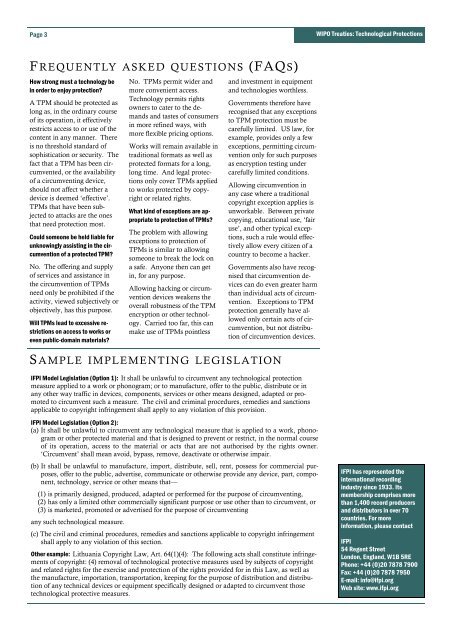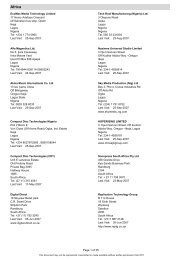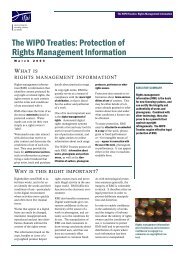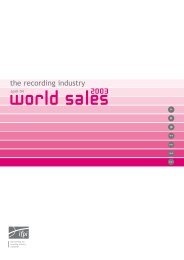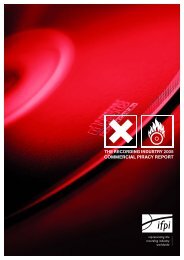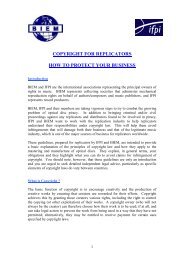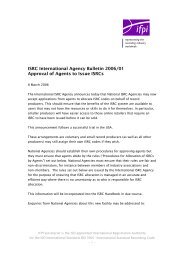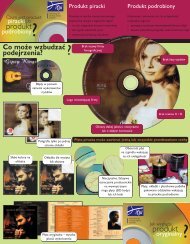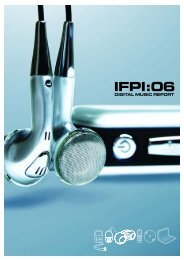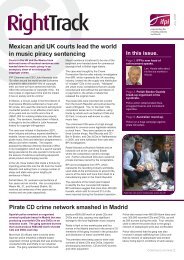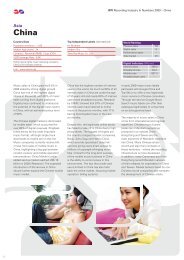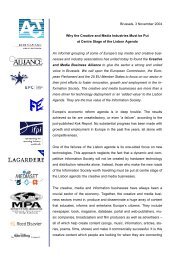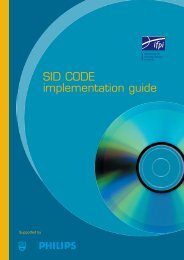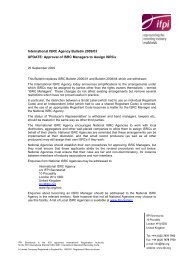The WIPO Treaties: Technological Measures - IFPI
The WIPO Treaties: Technological Measures - IFPI
The WIPO Treaties: Technological Measures - IFPI
Create successful ePaper yourself
Turn your PDF publications into a flip-book with our unique Google optimized e-Paper software.
Page 3<br />
<strong>WIPO</strong> <strong>Treaties</strong>: <strong>Technological</strong> Protections<br />
F REQUENTLY ASKED QUESTIONS (FAQS)<br />
How strong must a technology be<br />
in order to enjoy protection?<br />
A TPM should be protected as<br />
long as, in the ordinary course<br />
of its operation, it effectively<br />
restricts access to or use of the<br />
content in any manner. <strong>The</strong>re<br />
is no threshold standard of<br />
sophistication or security. <strong>The</strong><br />
fact that a TPM has been circumvented,<br />
or the availability<br />
of a circumventing device,<br />
should not affect whether a<br />
device is deemed ‘effective’.<br />
TPMs that have been subjected<br />
to attacks are the ones<br />
that need protection most.<br />
Could someone be held liable for<br />
unknowingly assisting in the circumvention<br />
of a protected TPM?<br />
No. <strong>The</strong> offering and supply<br />
of services and assistance in<br />
the circumvention of TPMs<br />
need only be prohibited if the<br />
activity, viewed subjectively or<br />
objectively, has this purpose.<br />
Will TPMs lead to excessive restrictions<br />
on access to works or<br />
even public-domain materials?<br />
No. TPMs permit wider and<br />
more convenient access.<br />
Technology permits rights<br />
owners to cater to the demands<br />
and tastes of consumers<br />
in more refined ways, with<br />
more flexible pricing options.<br />
Works will remain available in<br />
traditional formats as well as<br />
protected formats for a long,<br />
long time. And legal protections<br />
only cover TPMs applied<br />
to works protected by copyright<br />
or related rights.<br />
What kind of exceptions are appropriate<br />
to protection of TPMs?<br />
<strong>The</strong> problem with allowing<br />
exceptions to protection of<br />
TPMs is similar to allowing<br />
someone to break the lock on<br />
a safe. Anyone then can get<br />
in, for any purpose.<br />
Allowing hacking or circumvention<br />
devices weakens the<br />
overall robustness of the TPM<br />
encryption or other technology.<br />
Carried too far, this can<br />
make use of TPMs pointless<br />
and investment in equipment<br />
and technologies worthless.<br />
Governments therefore have<br />
recognised that any exceptions<br />
to TPM protection must be<br />
carefully limited. US law, for<br />
example, provides only a few<br />
exceptions, permitting circumvention<br />
only for such purposes<br />
as encryption testing under<br />
carefully limited conditions.<br />
Allowing circumvention in<br />
any case where a traditional<br />
copyright exception applies is<br />
unworkable. Between private<br />
copying, educational use, ‘fair<br />
use’, and other typical exceptions,<br />
such a rule would effectively<br />
allow every citizen of a<br />
country to become a hacker.<br />
Governments also have recognised<br />
that circumvention devices<br />
can do even greater harm<br />
than individual acts of circumvention.<br />
Exceptions to TPM<br />
protection generally have allowed<br />
only certain acts of circumvention,<br />
but not distribution<br />
of circumvention devices.<br />
S AMPLE IMPLEMENTING LEGISLATION<br />
<strong>IFPI</strong> Model Legislation (Option 1): It shall be unlawful to circumvent any technological protection<br />
measure applied to a work or phonogram; or to manufacture, offer to the public, distribute or in<br />
any other way traffic in devices, components, services or other means designed, adapted or promoted<br />
to circumvent such a measure. <strong>The</strong> civil and criminal procedures, remedies and sanctions<br />
applicable to copyright infringement shall apply to any violation of this provision.<br />
<strong>IFPI</strong> Model Legislation (Option 2):<br />
(a) It shall be unlawful to circumvent any technological measure that is applied to a work, phonogram<br />
or other protected material and that is designed to prevent or restrict, in the normal course<br />
of its operation, access to the material or acts that are not authorised by the rights owner.<br />
‘Circumvent’ shall mean avoid, bypass, remove, deactivate or otherwise impair.<br />
(b) It shall be unlawful to manufacture, import, distribute, sell, rent, possess for commercial purposes,<br />
offer to the public, advertise, communicate or otherwise provide any device, part, component,<br />
technology, service or other means that—<br />
(1) is primarily designed, produced, adapted or performed for the purpose of circumventing,<br />
(2) has only a limited other commercially significant purpose or use other than to circumvent, or<br />
(3) is marketed, promoted or advertised for the purpose of circumventing<br />
any such technological measure.<br />
(c) <strong>The</strong> civil and criminal procedures, remedies and sanctions applicable to copyright infringement<br />
shall apply to any violation of this section.<br />
Other example: Lithuania Copyright Law, Art. 64(1)(4): <strong>The</strong> following acts shall constitute infringements<br />
of copyright: (4) removal of technological protective measures used by subjects of copyright<br />
and related rights for the exercise and protection of the rights provided for in this Law, as well as<br />
the manufacture, importation, transportation, keeping for the purpose of distribution and distribution<br />
of any technical devices or equipment specifically designed or adapted to circumvent those<br />
technological protective measures.<br />
<strong>IFPI</strong> has represented the<br />
international recording<br />
industry since 1933. Its<br />
membership comprises more<br />
than 1,400 record producers<br />
and distributors in over 70<br />
countries. For more<br />
information, please contact<br />
<strong>IFPI</strong><br />
54 Regent Street<br />
London, England, W1B 5RE<br />
Phone: +44 (0)20 7878 7900<br />
Fax: +44 (0)20 7878 7950<br />
E-mail: info@ifpi.org<br />
Web site: www.ifpi.org


